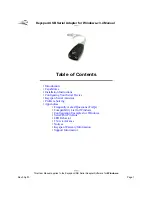
Cache Buffer
• 2K bit receive FIFO
• 2K bit transmit FIFO
Drivers Supported
• Microsoft Windows Server 2003
• Microsoft Windows XP/2000
• NDIS 3 driver
• NDIS 4 driver
• NDIS 5 driver
• Novell Netware Server 4.1X
• Novell Netware Server 5.X
• Novell Netware Server 6.X
• Linux : kernel v2.4.x
Standards
• IEEE 802.3u standard 100Mbps Ethernet
100Base-FX
• PCI local bus 2.2 specifications
• IEEE 802.3x Flow Control
• IEEE 802.1Q VLAN tagging
• IEEE 802.1p priority tagging
• Advanced Configuration and Power
Interface (ACPI) v.1.0
Network Media
Media interface: SC 62.5/125 micron
multimode fiber-optics (2km at full-duplex,
412m at half-duplex)
Diagnostic LEDs
• Link
• Activity (Tx/Rx)
• Full duplex
Power Consumption
1.5 Watts max
Temperature
• Storage: -13 ° ~ 131 °F (-25 ° ~ 55 °C)
• Operating: 32 ° ~ 122 °F (0 ° ~ 50 °C)
Humidity
10% to 90% non-condensing
Compliances
• FCC Class B
• VCCI Class B
• CE Class B
• C-Tick
• BSMI
Dimensions
4.73 x 2.88 inches (120 x 73 mm)
Weight
0.26 lb. (120g)
Remote Boot (Optional)
Boot ROM Address
• Searched by system BIOS
Boot ROM Flash Memory
• RPL boot ROM: 2KB
• PXE boot ROM: 2KB
Boot Servers Supported
• Novell RPL Boot ROM code
• NetWare 3.x, 4.x RPL server
• Microsoft Windows NT 3.51, 4.x RPL server
• Intel PXE 2.0
Warranty
• 1-Year
DFE-550FX
Optical Fiber Fast Ethernet Card
D-Link Systems, Inc. 17595 Mt. Herrmann Street Fountain Valley CA 92708 www.dlink.com
©2005 D-Link Corporation/D-Link Systems, Inc. All rights reserved. D-Link and the D-Link logo are registered
trademarks of D-Link Corporation or its subsidiaries in the United States and other countries. Other trademarks
are the property of their respective owners. All references to speed are for comparison purposes only. Product
specifications, size and shape are subject to change without notice, and actual product appearance may differ
from that depicted herein. Visit www.dlink.com for more details.
IEEE 802.1p Priority Queues Support
With packet prioritization capability, the
DFE-550FX allows traffic to be queued
as critical and non-critical, permitting
your computer to run Voice over IP
(VoIP), video-conferencing/ multimedia
applications and other time-sensitive traffic
with higher priority than non-critical
data. This in turn helps to eliminate jitter
and lag in multimedia streams.
RPL and PXE Remote Boot Options
With RPL (Remote Program Load) and
PXE (Pre-boot Execution Environment)
support, administrators can choose to set up
a security scheme for diskless workstations
to boot from. Stations with boot ROMs
installed on the on-board socket can boot
from NetWare, NT and other servers to run
applications designated by the administrator.




















